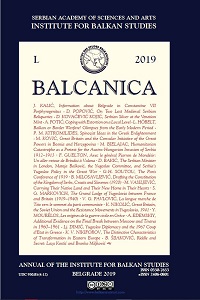Riddle and Secret: Laza Kostić and Branko Miljković around Heraclitus’ Fire
Riddle and Secret: Laza Kostić and Branko Miljković around Heraclitus’ Fire
Author(s): Bogoljub ŠijakovićSubject(s): History, Library and Information Science
Published by: Balkanološki institut - Srpska akademija nauka i umetnosti
Keywords: Heraclitus;Laza Kostić;Branko Miljković;riddle secret poetry;
Summary/Abstract: The culture of ancient Greece, and particularly its philosophy, contains paradigms that are predetermining, binding and eternally valid for the entire body of European culture. European culture and, in its distinctive way, Serbian culture, as an important dynamic motif has the need to constantly revisit Hellenic culture. This is in fact a productive (re) interpretation as a way of acquiring cultural self-awareness and self-knowledge. The entire cosmos and human fate in it are revealed in Hellenic thought as both a riddle and a secret. Both of these relationships to reality, in the model form found already in the work of Heraclitus, still characterize human thought and creation. The world seen as a riddle to be solved is the subject of many a discipline, and the secret that reveals itself to us provides the basis of faith and all arts. Two Serbian poets (although there are more) acquired their creative self-awareness around Heraclitus’ concept of fire. In his scholarly and philosophical treatises Laza Kostić (1841–1910) turned to Heraclitus in a bid to solve the riddle of reality. In his contemplative-poetic works Branko Miljković (1934–1961) turned to Heraclitus seeking to uncover the secret of nothingness in the latter’s fire and to learn from the Ephesian’s foretokening that poetry is hermetic and loves to hide. Is there a deeper logic linking riddle and secret? Do science, philosophy, art and faith have a deeper unity? The answers are to be sought in Laza’s and Branko’s understanding of Heraclitus’ fire.
Journal: BALCANICA
- Issue Year: 2019
- Issue No: 50
- Page Range: 437-452
- Page Count: 16
- Language: English

